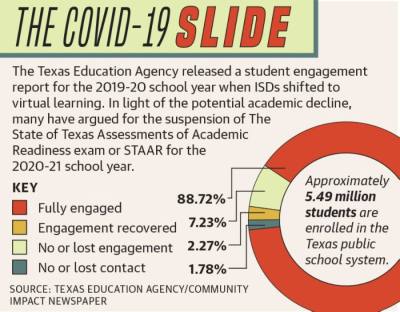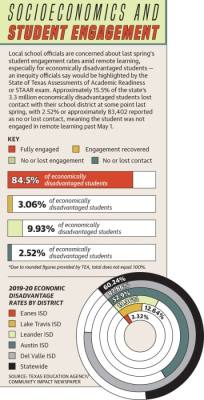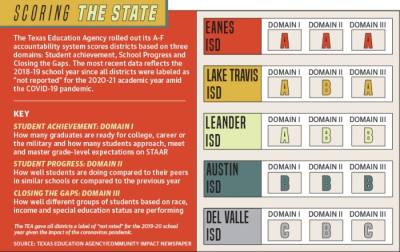When the coronavirus pandemic arrived in Texas last spring, it impacted nearly all walks of life. Throughout the state, a slew of businesses closed their doors while others pivoted to survive in the new unpredictable environment. Yet, amid the disruption, arguably no institution has been reshaped as dramatically as public education. Despite a year of unprecedented changes, one aspect of the state’s public school system will be maintained—the State of Texas Assessments of Academic Readiness or STAAR exam.
Yet, TEA’s decision last summer to conduct STAAR in the 2020-21 school year in order to track progress in basic subjects like math and reading was met with criticism across the state and locally from Eanes ISD administrators and parents.
The district passed a resolution Oct. 20 calling upon Abbott and TEA to request a waiver to suspend STAAR and its corresponding accountability system, which ranks districts using an A-F scale, to track both individual student and overall district performance.
“One of the reasons I support this resolution is because I think if the STAAR test goes forward this year, what it’s really going to highlight is inequity,” trustee John Havenstrite said.
While all ISDs struggled to adapt amid the pandemic, Havenstrite said that students in rural school districts were not performing as well this year.
The suspension of the exam would also allow the district and its educators to focus on recovering from the instructional gaps created when schools shifted to remote learning last spring, according to the resolution.
The resolution is finding support among EISD parents as well who are concerned about increasing the workload on students already struggling to keep up with coursework due to the lack of in-person instruction.
Last March, the exam was suspended by Abbott in the wake of coronavirus outbreaks, and many have argued a continued suspension would benefit both districts and students, particularly those who have academically struggled amid the pandemic.
The COVID-19 slide
EISD parents including Elizabeth Masse Hooks, said she is struggling to see the benefits of administering the exam this year. Not only does she worry about the mental stress the exam might place on students but says administering STAAR will distract from an already complicated academic year.
“In a normal year, [STAAR] is disruptive. In a COVID-19 year, when everybody’s life is already disrupted, I think it’s too much,” Masse Hooks said.
The four- to five-hour-long standardized test is a requirement for every public school student in grades three through 12 and contains reading, writing, math, science and social studies sections. Third through eighth grade students take the exam in the spring, and the student’s regular class schedule is halted for days in order to conduct the exam.
Masse Hooks, who has three children at EISD who are learning virtually, also said she is concerned regarding the health and safety precautions of conducting the exam amid the pandemic.
Meanwhile, TEA released a statement Nov. 5 confirming all students must be on campus at a monitored testing session to take the STAAR as well as its corresponding End-of-Course exam, set for Dec. 7-10, which is administered to high school students.
If a student engaged in remote learning is medically unable to take the exam in-person, a district may request a medical exclusion for the exam. The same holds true for students that were required to quarantine due to a COVID-19 exposure, a number that can change on a daily basis.
Following the agency’s announcement to keep the STAAR exam in place, several state officials reflected local parent’s concerns.
A bipartisan group of 68 Texas House representatives signed a letter Nov. 18 urging Texas Education Commissioner Mike Morath and TEA to seek the necessary federal waivers to allow for the cancellation of STAAR this year.
The letter sent by the office of Rep. Deigo Bernal, D-San Antonio, referenced the “COVID-19 slide” — a term coined by educators to explain the academic deficit caused by the pandemic.
The COVID slide ... has resulted in students, across the state, being behind grade-level in nearly every subject,” the letter read.
This statement is echoed by Heather Sheffield, president of the nonpartisan organization, Texans Advocating for Meaningful Student Assessments and EISD board member.
Until every student has the opportunity to learn in a normal school environment, Sheffield, speaking on behalf of TAMSA, said the exam should be waived. As a parent herself, she noted districts and teachers should have the opportunity to remain focused on providing high-quality education in the safest environment possible — a challenge she said could be disrupted by conducting STAAR.
“It’s important to know where our students are,” Sheffield said. “But I just think there are other more meaningful ways to assess them, and I think a little bit of grace is needed right now.”
TEA has frequently acknowledged the potential learning loss created when ISDs pivoted to 100% remote learning last spring. Typically, students experience seasonal learning loss during the summer, which varies by grade level and subject. TEA projected the pandemic would advance this decline, with students potentially falling a full year behind.
To provide flexibility, Abbott and Morath announced in a July press release that STAAR’s grade promotion requirements would be waived for students from fifth to eighth grade, meaning a student that fails the exam would not be held back.
“There is no benefit to our children by requiring them to repeat a year based on a single test score given the disruptions of COVID,” Morath said in the release.
However, Morath said that STAAR data remains a benefit to districts, parents and students, including those students who have struggled amid virtual learning.
EISD trustee Ellen Balthazar shared a similar sentiment prior to voting against the district’s STAAR resolution. While she said she was in favor of eliminating the high-stakes of the exam, certain districts rely on the data STAAR provides.
“I think the diagnostic nature of the STAAR test is very powerful and very beneficial,” Balthazar said.
Additionally, the letter sent by Texas representatives noted if STAAR was to be conducted this year, it should only serve as a diagnostic tool rather than an instrument to determine district sanctions under TEA’s accountability systems.
District accountability
Texas rolled out its current A-F accountability system as a result of House Bill 2804 passed by the 84th Texas Legislature in 2015 and since its inception, it has received criticism.
Ratings are determined by three domains: Student Achievement, which reflects how students performed on state assessments; School Progress, which compares students to their peers and Closing the Gap, which reflects how specific student populations are progressing. Seventy percent of the score is made up of either its Student Achievement or School Progress score — whichever is higher.
The system has, at times, been linked to a statewide trend in which more affluent districts generally score higher than districts with high levels of economically disadvantaged students — a concern educators feel will be exacerbated by the pandemic.
Sheffield said food insecurity, stable internet access, among other challenges can heavily impact a child’s academic year, especially during the pandemic. When education is not “apples to apples,” Sheffield said it does not make sense to give every student the same exam.
According to a July TEA engagement report, economically disadvantaged students — those who qualify for free or reduced lunch — overall, were less engaged in remote learning than non-economically disadvantaged students.
Furthermore, Morath stated during a June 30 presentation to the State Board of Education that students from low-income ZIP codes experienced an immediate decline in academic progress last spring. Still, he added there was solid evidence that data standardized testing produces can benefit this population.
Parents like Masse Hooks said she is not flatly against standardized testing, and she acknowledged the beneficial data they can provide. However, she said there are too many variables that could impact a student’s performance this year.
“The [2019-20 spring semester] was crisis schooling, and I think we’re still in it. We’re still figuring it out and adjusting,” Masse Hooks said. “What’s important is keeping our children mentally healthy. What’s important this year is giving them a good education within the confines of what we have.”•








